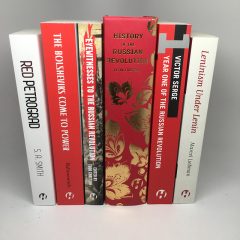HIST 3820A: Explorations in Historical Theory – “The Russian Revolution”
Fall 2024

Source: Haymarketbooks.org
Instructor: Professor Erica Fraser
What caused the Russian Revolution?
That’s easy, you might be thinking. Lenin did, through his actions in convincing his Bolshevik party to seize power in October, 1917, leading to the establishment of a communist government in Russia. But what if you wanted to argue that Lenin wasn’t really that big a force at the time, and the masses of workers on strike in the cities actually played a larger role? Or, what if you think none of that would have happened if not for the women marching through the capital city of Petrograd way back in February of that year, demanding food for their families?
Which one of these interpretations is “right”? – the Great Man theory, the Marxist focus on the working class, the point of view of gender history – or something else entirely? If you are interested in these kinds of questions, congratulations! You are interested in exploring historical theory: how historians conceive of past events and people, and what theoretical or conceptual influences shape their narrative decisions in writing about what happened – and why.
Using the case study of the Russian Revolution, this course will introduce students to some of the main theories of historical study today, including those listed above as well as power and discipline, public and private spheres, postmodernism, postcolonialism, history “from below,” queer theory, cultural history, experiential history, and more.
We will investigate how historians of the revolution – especially in the West – have shaped interpretations of it, beginning with early Cold War-era histories written in the 1950s, and we will explore the major theoretical and methodological approaches that they used in doing so. By examining the Russian Revolution in this way, History majors will gain a greater appreciation of both the ideas and theories underpinning history and the constantly evolving nature of historical scholarship. No matter your area of interest and specialization, this course and its case study will help you interpret, recognize, and apply theoretical frameworks to your own writing of history.
* This class fulfills the 0.5 credit theory requirement for History majors.
Online class format:
This online class will be conducted asynchronously, which means we will not meet at any set time. The course materials will consist of my lecture videos that you can watch any time during the week, supplementary videos or podcasts, weekly readings, and weekly writing exercises designed to keep you on track. That said, I will be available once a week or more for “live” office hours or optional Q-and-A sessions via web conferencing, and I will certainly be available to help you with your essays and take-home exams.
Prerequisites:
Students must be History majors and must pass HIST 2809 (The Historian’s Craft) before enrolling in this class. HIST 2600 (History of Russia) is recommended but not required. I understand that HIST 3820 is required for your major, and not all students will be specialists in Russian history. That’s OK. Come prepared to think and learn, and you will be able to succeed even if you have never studied Russian history before.
(If you are truly not interested in this case study, you should consider taking a different section of the course in the Winter term).
Assignments:
Weekly reading responses or discussion group posts, weekly quizzes, 2 essays, and a take-home final exam.
Texts:
Readings will consist of journal articles available electronically through the library catalogue or other resources available for free online.
Questions? Feel free to email me at erica.fraser@carleton.ca